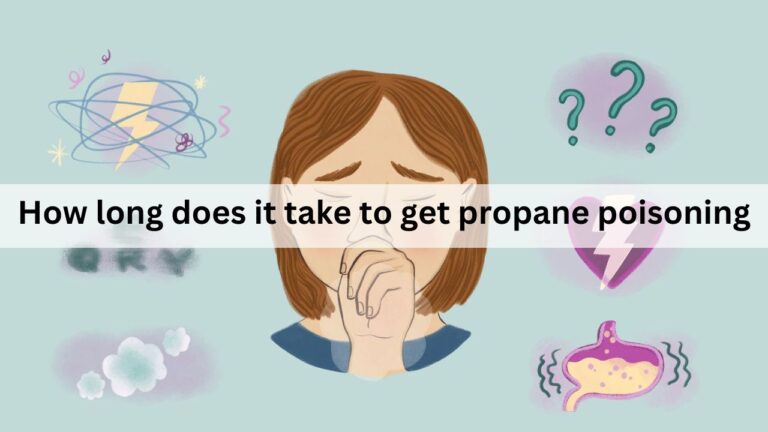
Propane poisoning is a severe medical condition that arises when individuals inhale excessive quantities of propane gas. This hazardous situation can lead to fatal outcomes, underscoring the significance of comprehending its nature and its impact on the human body. In this article, we will delve into the origins, hazards, and indications of propane poisoning, as well as its onset duration. Furthermore, we will provide essential insights on the most effective preventive measures and treatments.
Definition
Propane poisoning, also referred to as LPG poisoning (liquefied petroleum gas poisoning), occurs when propane gas is inhaled accidentally or intentionally. Propane, an odourless and colourless gas that is denser than air, has a tendency to gather in lower regions. Inhaling propane can lead to various symptoms, ranging from mild to severe.
Symptoms and Timeline
Individuals affected by propane poisoning may encounter a range of physical and psychological symptoms, which are contingent upon the concentration of inhaled propane. Common indications comprise dizziness, nausea, headaches, confusion, fatigue, and respiratory distress. In severe cases, propane poisoning can cause unconsciousness, seizures, and potential fatality.
The onset of propane poisoning effects can manifest within minutes of exposure and endure for several hours. The seriousness of symptoms is influenced by the quantity of propane inhaled and the promptness of medical intervention.
Causes and Risks
Propane finds application in various industries, including construction, agriculture, automotive, as well as residential heating and cooking. Consequently, there are multiple potential sources of propane poisoning.
Propane poisoning can arise from leaks in propane tanks or appliances, as well as from improper storage of propane. Additionally, intentional inhalation of propane gas for recreational purposes poses a significant danger. This behaviour can result in severe consequences such as brain damage, coma, and even fatality.
Certain risk factors contribute to the susceptibility of propane poisoning. Individuals with compromised immune systems or respiratory ailments are more prone to developing propane poisoning. Moreover, people residing in poorly ventilated areas or working in industries that utilise propane face heightened risks.
Long-Term Exposure to Propane Poisoning
Prolonged exposure to propane poisoning can result in significant physical and psychological consequences. From a physical standpoint, it can lead to organ damage and impairments in vision and hearing. Respiratory problems like asthma and bronchitis can also arise. Psychologically, individuals may experience memory loss, depression, and anxiety.
A study conducted by the University of Hawaii highlights the long-term neurological effects of propane exposure, including cognitive impairments, motor dysfunction, and peripheral neuropathy.
Prevention and Treatment
To prevent propane poisoning, it is crucial to refrain from using propane gas within enclosed spaces. Regular maintenance and inspection of propane tanks and appliances are essential preventive measures. In the event of a suspected leak, immediate evacuation from the area is strongly advised.
If an individual is exposed to propane, the initial step is to promptly remove them from the gas source. Subsequently, seeking immediate medical assistance is vital. Treatment usually involves oxygen therapy and close monitoring of vital signs. In certain cases, medication may be prescribed to alleviate symptoms.
Effects of propane poisoning on human health
Exposure to propane poisoning, whether short-term or long-term, can have severe consequences for human health. In the short term, it can result in symptoms such as dizziness, nausea, headaches, confusion, and fatigue. However, in the long term, it can lead to irreversible organ damage, respiratory issues, and neurological disorders.
Prognosis & Recovery Time for Propane Poisoning
The prognosis and duration of recovery for propane poisoning are influenced by several factors, including the level of propane inhalation and the promptness of medical intervention. Typically, the recovery period can range from a few days to several weeks.
However, it is important to note that propane poisoning can result in permanent effects in certain cases. Prolonged exposure has the potential to cause irreversible organ damage, as well as permanent vision and hearing impairment, along with neurological disorders.
Conclusion
Propane poisoning poses a grave threat to health, potentially leading to fatal outcomes. Understanding the causes, risks, symptoms, prevention methods, and treatment options associated with propane poisoning is crucial for safeguarding oneself and loved ones from its dangers.
To minimise the risk of propane poisoning, it is essential to refrain from using propane in enclosed spaces and to ensure regular maintenance and inspection of propane tanks and appliances. If there is suspicion of propane exposure, immediate medical attention should be sought without delay.
FAQ
Q1: What are the common symptoms of propane poisoning?
Ans: Common symptoms include dizziness, nausea, headaches, confusion, and fatigue.
Q2: How long does it take to recover from propane poisoning?
Ans: Recovery time can range from a few days to several weeks, depending on the case.
Q3:What are the risks of long-term propane exposure?
Ans: Long-term exposure to propane can result in respiratory problems, organ damage, and neurological disorders.
Q4: How can propane poisoning be prevented?
Ans: Avoid using propane in enclosed spaces and ensure regular maintenance of tanks and appliances.
Q5: What should I do if I suspect propane poisoning?
Ans: Seek immediate medical attention if there is suspicion of propane exposure.